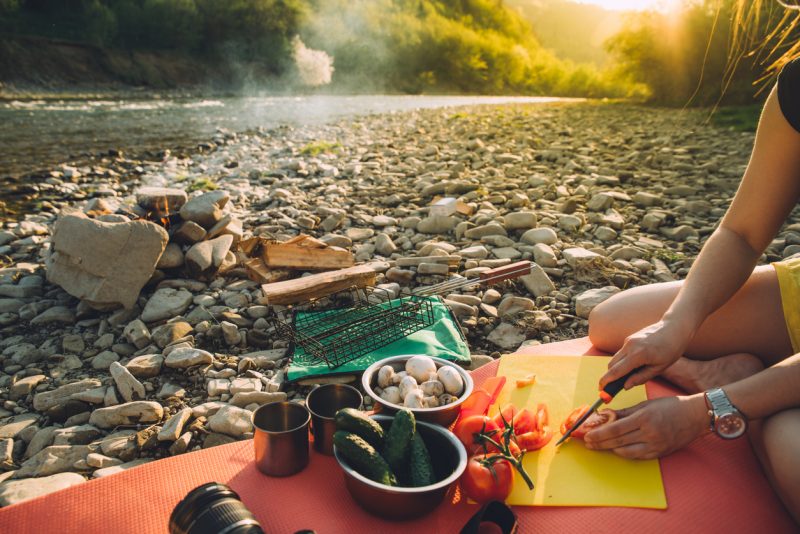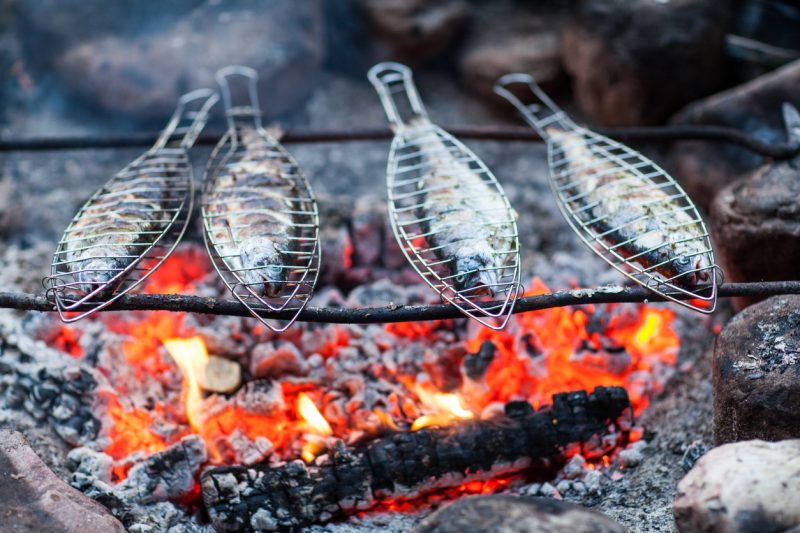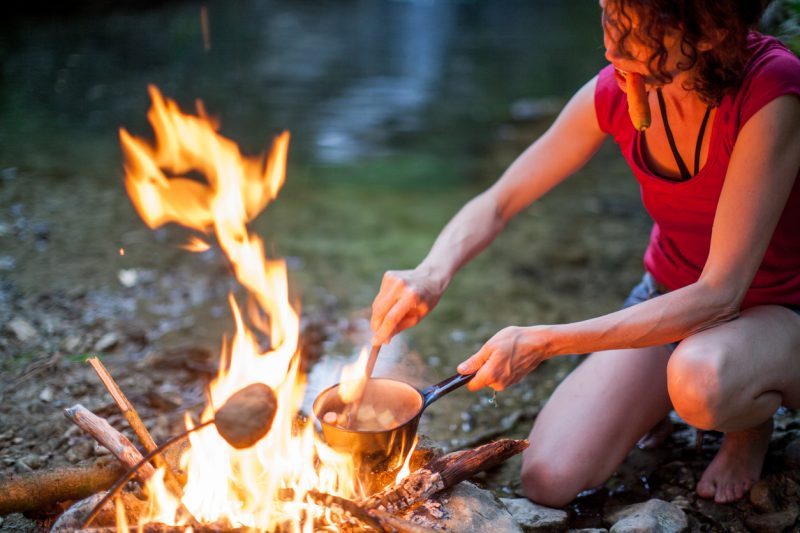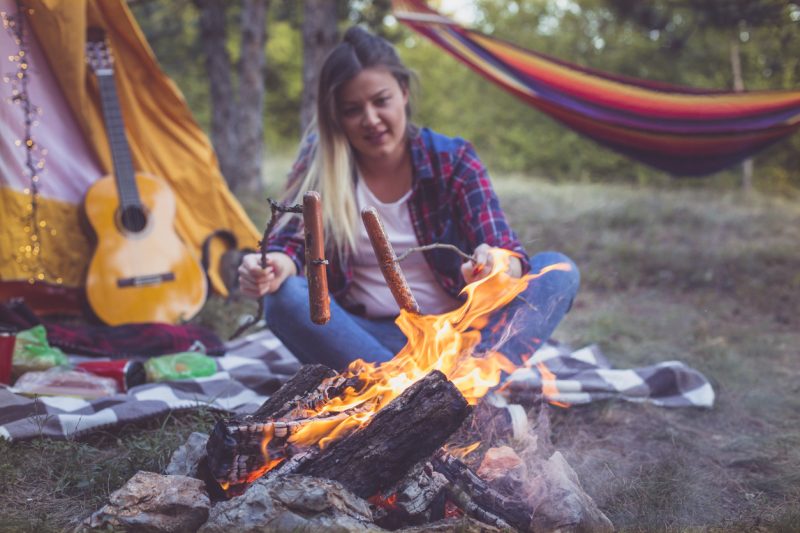Cooking Over a Fire – Why is It Such An Important Skill?
One of the most basic, and possibly overlooked, things to practice to prepare for the wilderness is cooking your food. We all know that we need to eat, but there are so many fieldcraft skills to hone and events to prepare for that cooking over a fire is a skill that is all too often overlooked. Whether you are planning a camping trip, hiking the Appalachian Trail, or preparing for a survival situation, learning to cook your food over a fire is an essential skill for keeping high morale and a full belly in the wilderness.
Why Cooking is an Important Skill

We are all most likely aware that cooking is one of the great inventions of time that has led to improved health and the growth of the human race. It is also a pretty well-known fact that food tastes better cooked than raw, in most cases.
Cooking our food allows many nutrients to be released and be more easily digested and used by our bodies. This is especially important in the wilderness because your body will expend more energy than usual, and every calorie ingested is important for maintaining your ability to work.
Whether you are in the wilderness for enjoyment on a planned trip or in a survival situation, that increased workload can be mentally draining as well as physically. An often overlooked component of survival is having morale high enough to make you want to continue on. A delicious hot meal can often be a welcome break from the arduous work that is required in a survival situation.
Preparation

For the purposes of this article, we will assume you have food to cook. Whether you have game that you have hunted, fish you have caught, or food you have packed, the preparation for cooking will be pretty much the same. The first thing you need in order to make a proper cooking fire is fuel, and that fuel will generally be in the form of wood.
When gathering wood, you need to make sure you have plenty to last throughout the cooking session; a dwindling fire in the middle of your meal preparation will spoil the food and the experience. A good rule of thumb is to collect as much wood as you need and then double it.
When you are building your fire, the goal is usually to have a bed of hot coals to cook over as the temperature of the coals will be more constant than a roaring fire. There are some times when you do want flames going as well though. It can be beneficial to move a coal bed to one side of the fire and keep the burning fuel with live flames on the other side; this allows you to use your fire for more than one purpose at a time.
Another consideration is what wood you might use as fuel. Softwoods like poplar or pine give off a lot of ash and burn quickly, making them a challenging and less desirable wood to cook with.
Hardwoods are usually the best choice for cooking as they burn hot and for a longer time. Some aromatic woods have special benefits, such as using cedar to help flavor fish. You may have to use what is available, but you will generally want to seek out hardwoods such as oak or tamarack if possible.
Special Considerations

One thing that is not immediately recognized when cooking over a fire is the fact that food will generally stay hotter for longer when it is removed from the heat.
This means that your food will continue to cook for longer after it is removed from the heat than you would expect when cooking on a stove.
If you are concerned about over-cooked food, you need to take your food off the fire before you think it is ready and let it rest for a short time. Overcooking your food can hurt morale which can be vital in a survival situation or, even worse, it can destroy vital nutritional value that will be needed to sustain yourself.
You will also need to consider what tools you have available to cook with. During a planned expedition you are likely to have grates, pots, pans, utensils, etc. If your extended visit to the wilderness is not planned, you will likely not have these luxuries available to you.
You can, however, craft or scavenge what you need to prepare your food. As people continue to disrespect our forests at an alarming rate, it actually becomes easier for the survivalist to find things that can be used as grates, cans to hold liquids, and other items that would otherwise be considered trash which can be used to your advantage.
Cooking Without Utensils

The military often provides bushcrafters with a wealth of information based on years of experience and lessons learned in some of the most challenging situations. This next piece of information comes from the military but you probably won’t find it in any manuals.
During the revolutionary war, our Soldiers had to cook over open fires and often had to do so without the proper tools, using something as simple as a plank of wood to hold food near the fire.
Fire cakes were a popular food eaten by revolutionaries. They were a rudimentary bread smashed to a plank and placed near the fire to cook. Wood planks, when soaked in water, can be a great substitute for a pan when cooking fish or thin pieces of meat.
Skewers can also be extremely versatile for cooking solid foods, especially fish and meat. Soak your skewers in water prior to cooking over an open flame to reduce the risk of the skewer catching fire and dropping your food into the coals and ash.
Takeaways
While this could easily become a novel about how to cook in the wilderness – there are plenty of open fire cookbooks – I hope you at least take away the importance of learning to cook over a fire.
I also hope you take away some of the tips and use them as a guide to help spark the innovative part of your mind when determining how you might prepare your food in the wilderness. Whether you are planning a menu for your next camping trip or preparing for an unplanned visit to the woods, the ability to cook over a fire is something I recommend you add to your skill set.





